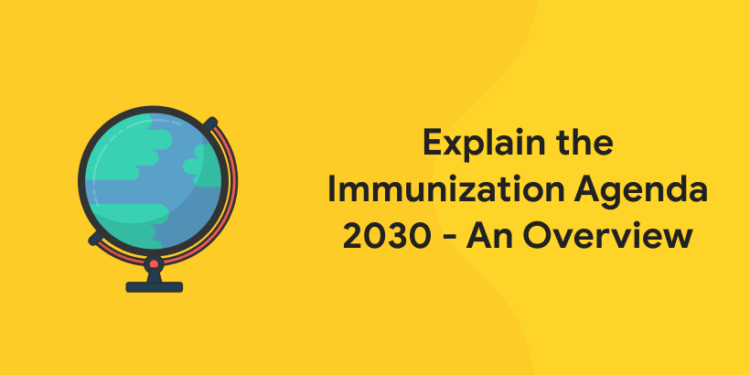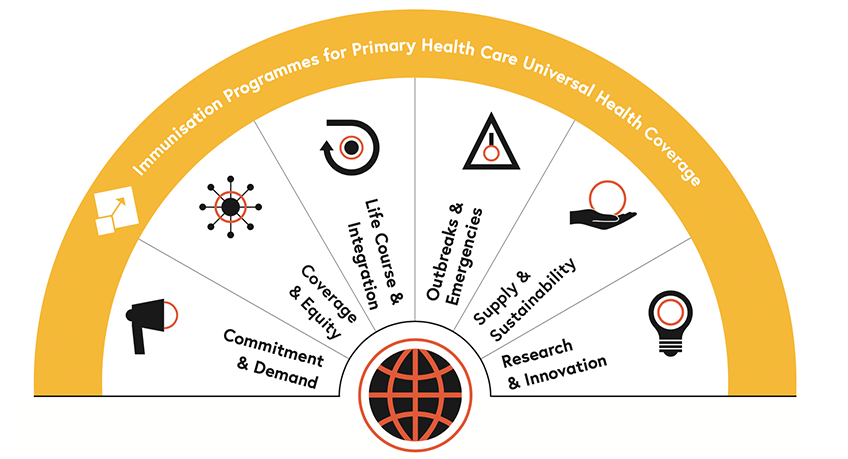Table of Contents
Immunization is a global health and development success story, protecting millions of lives every year. We now have vaccines to prevent more than 20 life-threatening diseases, which helps people of all ages live longer and healthier lives. Immunization is the basis of the primary health care system and an undeniable human right. It’s also one of the best health investments money can purchase. Yet in spite of tremendous progress, far too many people around the world – including nearly 20 million infants every year – have inadequate access to vaccines. In some countries, progress has delayed or even reversed, and there is a real risk that contentment will damage past achievements.
The COVID-19 pandemic has pointed out the world of the power of vaccines to fight disease, protect lives, and create a healthier, safer, and more prosperous future. Moving forward, strong immunization systems will be required to assure that people everywhere are protected against COVID-19 and other diseases.
Attempt Free GK Test! Download Entri App!
The World Health Assembly, with the support of countries and partners, has supported a new global vision and strategy, known as the Immunization Agenda 2030 (IA2030), to mention these challenges over the next decade and save over 50 million lives.
Immunization Agenda 2030 visualizes a world where everyone, everywhere, at every age, fully make use of the vaccines to enhance health and well-being. It objects to maintain hard-won gains in immunization, recover from the disturbances caused by COVID-19, and attain even more – by leaving no one behind, in any circumstances or at any stage of life.
Grab Latest Study Materials! Register Here!
Strategic priorities
Immunization Agenda 2030 has been formulated through a “bottom-up” co-creation process, with close engagement of countries to assure that the vision, strategic priorities and goals are lined up with country needs. As an adaptive and flexible strategy, the Immunization Agenda 2030 framework is developed to be modified by countries to their local context, and to be revised throughout the decade as new needs and challenges appear.
The Monitoring and Evaluation (M&E) Framework consists of adjustable indicators to allow the use of data for action to continuously enhance immunization programs at all stages. Beneath Immunization Agenda 2030’s three Impact Goals are seven Impact Goal Indicators to observe progress across country, regional and global levels. The M&E framework provides strategic priority objectives and indicator options for regions and countries to inform the growth of their own M&E Frameworks.
Attempt Free GK Test! Download Entri App!
I A 2030 goals are framed to stimulate action for implementation and support efforts to enhance health security, universal health coverage, access and equity for immunization and innovation.
For countries, this could mean setting country-specific objects and milestones for the decade toward those targets. For regions, this could mean deciding global goals and setting specific objects and milestones in Regional Vaccination Action Plans. For partner organisations, this could mean lining up organizational strategies and indicators to support the achievement of I A 2030 goals.
The I A 2030 strategy—to increase the benefits of vaccines to everyone, everywhere—is developed by four core principles: it puts people in the centre, is led by countries, implemented through broad partnerships, and driven by data. The I A 2030 strategy completely involves the core principles across each of the strategic priorities.
Attempt Free GK Test! Download Entri App!

Strategic Priority Goals
1: Who was the first woman President of India?
Each strategic priority has strategic priority goals as the foundation for assessing progress. These goals complement surviving disease-specific goals, wider health goals, and the Sustainable Development Goals (SDGs). The strategic priority goals reflect the ambition of these existing commitments and objects to stimulate efforts to attain important gains in immunization over the coming decade.

Immunization is playing a crucial part in attaining the Sustainable Development Goals (SDGs). Immunization reaches more people than any other health and social service, making it the basis of primary health care systems and a key driver toward universal health coverage. This makes immunization crucial to SDG3 – to assure healthy lives and enhance well-being for all at all ages. Because health is so necessary to development, I A 2030 will also provide —either directly or indirectly—to 13 of the other SDGs. Immunization is an investment for the future, preparing a healthier, safer and more prosperous world for all.
Free UPSKILLING Courses!
Take your first step toward mastering in-demand skills, acing interviews, and securing top-tier jobs with Entri's free upskilling courses.
Start Learning!Key Points About the Immunisation Agenda 2030 (IA2030):
- It sets an ambitious, overarching global vision and strategy for vaccines and immunization for the decade 2021–2030.
- The IA2030 is based on teachings from Global Vaccine Action Plan (GVAP). It targets to locate the unmet aims of the GVAP that were at first to be achieved as part of the global immunisation strategy of the ‘Decade of vaccines’ (2011–2020).
- GVAP was framed to enable realize the vision of the Decade of Vaccines, that all individuals and communities enjoy lives free from vaccine preventable diseases.
- It is based on a conceptual framework of seven strategic priorities, to assure that immunization fully provides a stronger primary health care and fulfillment of universal health coverage.
- It is supported by four core principles: it puts people in the centre, is led by countries, implemented through broad partnerships, and driven by data.
Targets of Immunization Agenda 2030:
- As part of this new immunization programme, global agencies like the World Health Organization (WHO), UNICEF and others have set an aim of avoiding 50 million vaccine-preventable infections in this decade.
- It also intends to reduce the number of zero-dose children by 50%.
- Zero-dose children are those who have received no vaccines through immunization programmes.
- To attain 90% coverage for essential vaccines given in childhood and adolescence.
- To fulfill 500 national or subnational introductions of new or under-utilized vaccines – such as those for Covid-19, rotavirus, or human papillomavirus (HPV).
- The UN agencies aim to assure through IA2030 that the benefits of immunization are shared equitably among and within countries.
Priority Section of the Population:
- The new programme will target on a ‘bottoms-up’ approach, in contrast to the GVAP that followed a ‘top-down’ one.
- It will give more importance to populations that are not presently being reached, especially the most marginalised communities, those living in fragile and conflict-affected settings and mobile populations, such as those moving across borders.
Free UPSKILLING Courses!
Take your first step toward mastering in-demand skills, acing interviews, and securing top-tier jobs with Entri's free upskilling courses.
Start Learning!India’s Initiatives on Immunization:
- The Intensified Mission Indradhanush (IMI) 3.0 scheme has been rolled out to cover children and pregnant women recently who missed routine immunisation during the Covid-19 pandemic.
- The Immunization Programme in India was invented in 1978 as ‘Expanded Programme of Immunization (EPI) by the Ministry of Health and Family Welfare. In 1985, the Programme was modified as ‘Universal Immunization Programme (UIP)’.
- India is also the important supplier to COVAX, a global initiative aimed at equitable access to Covid-19 vaccines led by UNICEF, Gavi (The Vaccine Alliance) , the World Health Organization, the Coalition for Epidemic Preparedness and others.
- India also started its ‘Vaccine Maitri’ to supply Covid vaccine to different nations.
Attempt Free GK Test! Download Entri App!
World Immunization Week
- World Immunization Week is celebrated in the last week of April every year.
- It targets to stimulate the use of vaccines to save people of all ages against disease.
- Immunisation explains the process whereby people are protected against illness caused by infection with microorganisms (formally called pathogens). The term vaccine mean the material used for immunisation.
- Immunization is a success story for global health and development, protecting millions of people every year.
- The theme for 2021 is “Vaccines bring us closer”.
Grab Latest Study Materials! Register Here!














